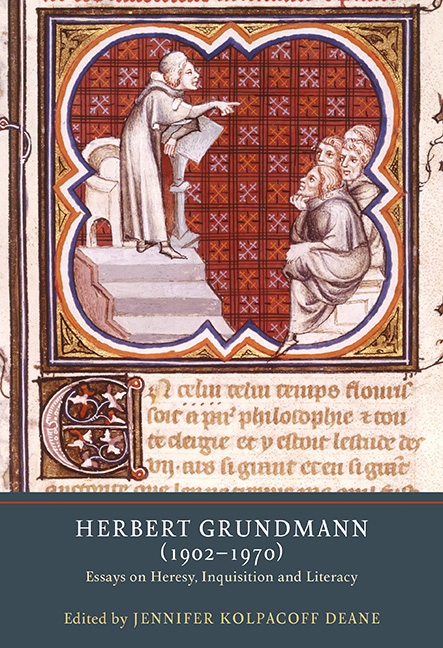Book contents
- Frontmatter
- Contents
- Acknowledgements
- Abbreviations
- Introduction
- Note on the Text
- 1 The Profile (Typus) of the Heretic in Medieval Perception
- 2 Women and Literature in the Middle Ages: A Contribution on the Origins of Vernacular Writing
- 3 Litteratus–Illitteratus: The Transformation of an Educational Standard from Antiquity to the Middle Ages
- 4 Heresy Interrogations in the Late Middle Ages as a Source-Critical Problem
- 5 Oportet et Haereses Esse: The Problem of Heresy in the Mirror of Medieval Biblical Exegesis
- 6 Learned and Popular Heresies of the Middle Ages
- 7 Obituary Essay (1970) by Arno Borst [annotations by Dr Letha Böhringer]
- 8 Bibliography of Herbert Grundmann
- Index
- YORK MEDIEVAL PRESS: PUBLICATIONS
4 - Heresy Interrogations in the Late Middle Ages as a Source-Critical Problem
Published online by Cambridge University Press: 19 March 2020
- Frontmatter
- Contents
- Acknowledgements
- Abbreviations
- Introduction
- Note on the Text
- 1 The Profile (Typus) of the Heretic in Medieval Perception
- 2 Women and Literature in the Middle Ages: A Contribution on the Origins of Vernacular Writing
- 3 Litteratus–Illitteratus: The Transformation of an Educational Standard from Antiquity to the Middle Ages
- 4 Heresy Interrogations in the Late Middle Ages as a Source-Critical Problem
- 5 Oportet et Haereses Esse: The Problem of Heresy in the Mirror of Medieval Biblical Exegesis
- 6 Learned and Popular Heresies of the Middle Ages
- 7 Obituary Essay (1970) by Arno Borst [annotations by Dr Letha Böhringer]
- 8 Bibliography of Herbert Grundmann
- Index
- YORK MEDIEVAL PRESS: PUBLICATIONS
Summary
Inquisitors’ Questions (Interrogatoria)
The first papal inquisitor in northern France during the 1240s was the Dominican Robert le Petit. Known as le Bougre, he earned a villainous reputation for having forced many innocent people into compromising confessions in order to convict them of heresy and condemn them to death by fire. As complaints mounted, he was recalled by Pope Gregory IX and actually imprisoned by his religious order. The chronicler of the Senones cloister in the Vosges in the bishopric of Toul, the Benedictine Richer, recounted a particularly astonishing story. Robert was very learned and eloquent, second to none in Paris, but – it was said – thought about and desired fame excessively. Using diabolical means, he prepared a document (cartula) that he only had to place upon one's head to cause that person helplessly to declare everything the inquisitor wanted to hear. One day, during his sermon, he saw a beautiful woman, and he asked her to come to him after the sermon. Expecting that he wanted to hear her confession, she went to him alone; but he pressed her with flattery and threatened that if she would not yield to his desire, he would convict her of heresy and have her burned. But she remained determined. The next day he displayed her to the public, laying his hand on her head and asking her whether she belonged to the heretical sect. She agreed and rejected his second question, which was whether she wished to return to the Catholic faith, declaring she would rather die than renounce the sect. And so Robert could say, ‘You have heard how this woman confesses to her shame’, and arrested her.
All marvelled at this, for they had never heard the like from her. Her son, however, a gifted young cleric, asked everywhere how to save his mother from a heretic's death. A sympathetic friend, who knew the Dominican well, advised: ‘When your mother is publicly heard again tomorrow, step up next to her, and when Master Robert lays his hand on her head, grab his hand – you are certainly stronger than he is – and take away the cartula you find under the hand; hold onto it and ask Master Robert to ask his mother again about her faith.’
- Type
- Chapter
- Information
- Herbert Grundmann (1902–1970)Essays on Heresy, Inquisition, and Literacy, pp. 126 - 179Publisher: Boydell & BrewerPrint publication year: 2019

